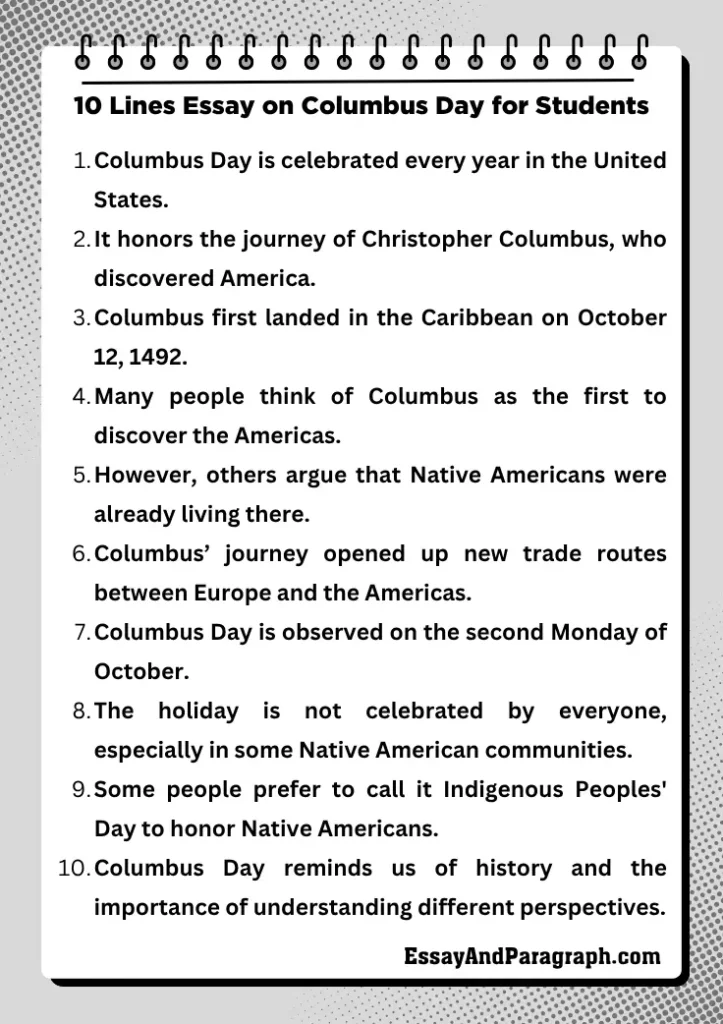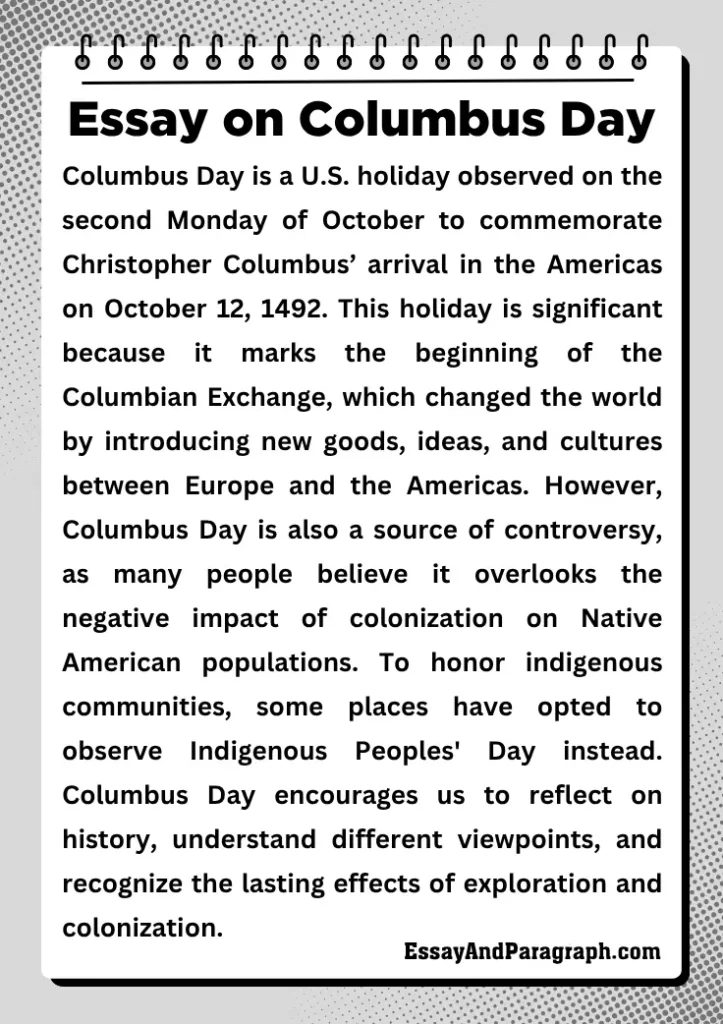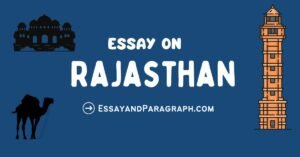Have you ever wondered why we celebrate Columbus Day? It’s a holiday that many people observe in the United States, but not everyone knows exactly why it’s so important. Columbus Day is a celebration of the journey made by Christopher Columbus, the explorer who is credited with discovering the Americas in 1492. This holiday gives us a chance to think about his journey and the impact it had on the world. In this article, we will learn how to write an essay on Columbus Day and explore what makes it such a significant occasion.
10 Lines Essay on Columbus Day for Students
Columbus Day is celebrated every year in the United States.
It honors the journey of Christopher Columbus, who discovered America.
Columbus first landed in the Caribbean on October 12, 1492.
Many people think of Columbus as the first to discover the Americas.
However, others argue that Native Americans were already living there.
Columbus’ journey opened up new trade routes between Europe and the Americas.
Columbus Day is observed on the second Monday of October.
The holiday is not celebrated by everyone, especially in some Native American communities.
Some people prefer to call it Indigenous Peoples’ Day to honor Native Americans.
Columbus Day reminds us of history and the importance of understanding different perspectives.
 Essay on Columbus Day
Essay on Columbus Day
Essay on Columbus Day – 100 words
Columbus Day is celebrated on the second Monday of October to honor the journey of Christopher Columbus, who first landed in the Americas on October 12, 1492. While many people view this day as a celebration of Columbus’ discovery, it is important to acknowledge that Native Americans were already living on the continent. Columbus’ journey led to new trade routes and exchanges between Europe and the Americas, shaping the world we know today. However, not everyone agrees with the celebration of this holiday. Some people prefer to observe Indigenous Peoples’ Day, which recognizes the contributions and cultures of Native Americans.
Essay on Columbus Day – 150 words
Columbus Day is celebrated on the second Monday of October in the United States to honor Christopher Columbus’ famous journey in 1492 when he landed in the Americas. Columbus’ arrival is often regarded as the beginning of European exploration and colonization of the New World, which had significant global consequences. His voyages helped establish trade routes between Europe and the Americas, starting a period of cultural exchange known as the Columbian Exchange.
However, Columbus Day is controversial for many, especially Native American communities. The arrival of Columbus is seen by some as the beginning of colonization, which led to the exploitation, displacement, and suffering of indigenous populations. Because of this, many people prefer to celebrate Indigenous Peoples’ Day, which honors Native American history and cultures. Regardless of which day is observed, Columbus Day serves as an opportunity to reflect on history and acknowledge its complex and varied impacts.
Essay on Columbus Day – 200 words
Columbus Day is a holiday celebrated on the second Monday of October in the United States. It honors Christopher Columbus’ famous journey in 1492 when he sailed across the Atlantic Ocean and landed in the Caribbean, marking a pivotal moment in world history. For many, Columbus is seen as the explorer who “discovered” America, even though Native Americans had been living on the continent for thousands of years before his arrival.
While Columbus’ discovery led to significant changes in world history, such as opening up new trade routes between Europe and the Americas, the holiday is not without controversy. Some people believe Columbus’ arrival had negative effects on Native Americans, including the spread of diseases, displacement, and violence. In light of this, some states and communities have chosen to replace Columbus Day with Indigenous Peoples’ Day to honor and celebrate the rich cultures and histories of Native American peoples.
Columbus Day offers an opportunity to reflect on history and consider different perspectives. It also serves as a reminder of the complex history of exploration and colonization. Whether you celebrate it as Columbus Day or Indigenous Peoples’ Day, it’s important to understand the significance of this holiday and how it relates to both historical events and contemporary discussions about indigenous rights.
Short Essay on Columbus Day – 250 words
Columbus Day is a national holiday in the United States, celebrated on the second Monday of October. It marks the day when Christopher Columbus, an Italian explorer, arrived in the Americas on October 12, 1492. Columbus is often credited with “discovering” America, though many historians note that the land was already inhabited by Native Americans long before his arrival.
Columbus’ journey had a profound impact on world history. His exploration led to the Columbian Exchange, a period of cultural and biological exchanges between the Old World (Europe) and the New World (the Americas). These exchanges included the transfer of goods, ideas, and diseases, which forever altered the course of history.
However, Columbus Day is a controversial holiday. Some view it as a celebration of exploration and discovery, while others believe it symbolizes the beginning of colonization and the mistreatment of indigenous peoples. In recent years, many cities and states have replaced Columbus Day with Indigenous Peoples’ Day, which honors Native American communities and their heritage.
Despite the debate, Columbus Day serves as an opportunity to reflect on the complexities of history and recognize the importance of understanding different cultural perspectives. Whether you see it as Columbus Day or Indigenous Peoples’ Day, the holiday reminds us to think critically about our past and its long-lasting effects on present-day society.
Long Essay on Columbus Day – 500 words
Columbus Day is a holiday celebrated on the second Monday of October in the United States. It commemorates the journey of Christopher Columbus, the Italian explorer who, in 1492, sailed across the Atlantic Ocean and made landfall in the Caribbean. Columbus’ arrival in the Americas is often regarded as one of the most significant moments in history, as it led to the exchange of goods, ideas, and people between the Old World and the New World. This period, known as the Columbian Exchange, fundamentally reshaped the global landscape.
For many people, Columbus Day is a celebration of discovery and exploration. Columbus is seen as a hero who helped connect the continents and expand the known world. His voyages were groundbreaking, paving the way for European exploration and colonization of the Americas. The holiday is celebrated with parades, events, and reflections on Columbus’ contributions to world history.
However, Columbus Day has become a subject of controversy in recent years. Critics argue that Columbus’ arrival in the Americas marked the beginning of a long period of exploitation, violence, and displacement for Native American communities. The spread of diseases, forced labor, and loss of land are some of the negative consequences that followed Columbus’ exploration. Many people, particularly in indigenous communities, feel that the holiday should not be celebrated as it overlooks the suffering of Native Americans.
In response to this criticism, some states and cities have chosen to replace Columbus Day with Indigenous Peoples’ Day, a holiday that recognizes and celebrates the cultures, histories, and contributions of Native American communities. The shift toward Indigenous Peoples’ Day is seen as a way to honor the resilience of indigenous peoples and acknowledge the painful legacy of colonization.
While the debate over Columbus Day continues, the holiday presents an opportunity for reflection. It encourages us to think about the complexities of history and how different people experience it. Columbus’ arrival in the Americas, though significant in shaping the modern world, was not without consequences for the indigenous peoples who already lived there. By recognizing this, we can gain a deeper understanding of history and its lasting impact on contemporary society.
In conclusion, Columbus Day serves as both a celebration and a reminder of the importance of historical perspective. It reminds us of the ways in which history is interpreted and understood differently by different groups of people. Whether celebrated as Columbus Day or Indigenous Peoples’ Day, the holiday provides a chance to reflect on our shared history, acknowledge its complexities, and promote a more inclusive understanding of the past.
FAQs : Essay on Columbus Day
1. What is Columbus Day and why do we celebrate it?
Columbus Day is a U.S. holiday that celebrates the arrival of Christopher Columbus in the Americas on October 12, 1492. It marks the beginning of European exploration and colonization of the New World, leading to a significant exchange of goods, ideas, and cultures between Europe and the Americas. The holiday is observed on the second Monday of October each year.
2. When did Columbus Day become a federal holiday?
Columbus Day became a federal holiday in the United States in 1937. Prior to that, it had been celebrated in various states and regions, but it was officially recognized nationwide after President Franklin D. Roosevelt signed it into law. Since then, it has been celebrated annually on the second Monday of October.
3. Why is Columbus Day controversial?
Columbus Day is controversial because many people argue that Columbus’ arrival in the Americas marked the beginning of colonization, which led to the displacement, violence, and exploitation of Native American populations. Some communities prefer to observe Indigenous Peoples’ Day as a way to honor the cultures and contributions of Native Americans, rather than celebrating Columbus.
4. What is Indigenous Peoples’ Day?
Indigenous Peoples’ Day is an alternative holiday to Columbus Day that celebrates the cultures, histories, and contributions of Native American communities. It aims to recognize the impact of colonization on indigenous peoples and acknowledges their ongoing struggles. Many U.S. cities and states now observe Indigenous Peoples’ Day instead of Columbus Day.
5. How do people celebrate Columbus Day?
Columbus Day is often celebrated with parades, festivals, and educational events. In some places, schools and businesses are closed. However, celebrations may differ across the country, with some communities choosing to focus on Columbus’ achievements and others choosing to reflect on the impact of colonization.
Top 5 Quotes Essay on Columbus Day
“Columbus did not discover a new world. He discovered an old world that had been waiting for him.” – Anonymous
“The voyage of Columbus changed the world forever, for better or worse.” – Unknown
“Exploration is the act of discovering something new, even if it means uncovering painful truths.” – Unknown
“It’s important to remember that history is told from many perspectives.” – Unknown
“We celebrate Columbus Day, but it’s essential to recognize the land and cultures that existed long before him.” – Unknown
Summary : Essay on Columbus Day
Columbus Day is a U.S. holiday observed on the second Monday of October to commemorate Christopher Columbus’ arrival in the Americas on October 12, 1492. This holiday is significant because it marks the beginning of the Columbian Exchange, which changed the world by introducing new goods, ideas, and cultures between Europe and the Americas. However, Columbus Day is also a source of controversy, as many people believe it overlooks the negative impact of colonization on Native American populations. To honor indigenous communities, some places have opted to observe Indigenous Peoples’ Day instead. Columbus Day encourages us to reflect on history, understand different viewpoints, and recognize the lasting effects of exploration and colonization.




